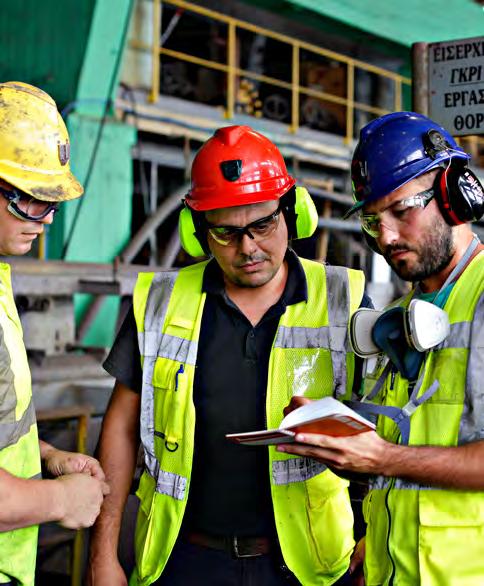4 minute read
1. In Focus: Managing Sustainability
To holistically examine Sustainability topics related to our significant economic, environmental and social impacts or could substantially influence our Stakeholders’ views and decisions, we conducted a Materiality Analysis, which we used to determine the present Report’s content (following GRI’s 4 Report Content Principles) and the topics’ scope (boundaries), without any changes compared to the previous period (e.g. regarding Material Topics). The Materiality Analysis is structured around the Sustainability Framework’s Areas and sub-Areas, following the below stages:
Stage 1: Identifying potential Topics
Stage 2: Analysing associated Risks
Stage 3: Identifying Stakeholder Expectations
Stage 4: Combination
Consideration of over 100 topics by reviewing current industry practices, future trends and relevant industry related analyses by international organizations
Materiality Analysis
Analysis according to the significance of economic, social, and environmental impacts that our activities and operations either have or could have, in terms of likelihood and consequences
Consideration of expectations through relevant surveys conducted and indirect input from the departments which interact with each Stakeholder Group, as well as the GRI studies ‘Sustainability Topics for Sectors’ and ‘Defining What Matters’
Combination of Risk analysis and Stakeholders’ expectations to define the Material Topics that we should focus on. The Risk axis takes into consideration the results of the in-house ‘Sustainability Day’ in 2019, where directors and managers from all levels discussed about our sustainability performance and prioritized related topics. The Stakeholder axis takes into consideration views identified during the latest engagement events, which were prior to 2020 due to the pandemic.
The Materiality Analysis was approved by the Vice President & Managing Director and the CSR & Community Relations Director, who also approved the present Report. Through this Analysis, we have identified the following Material Topics for 2020, while all Topics that were not deemed Material are not represented schematically due to the number of Topics addressed.
Materiality Analysis
High >
Socioeconomic Compliance Price of Gold Public Policy Reserves Permitting & Licensing Environmental Compliance Accident Impact Community Engagement Production Health & Safety
Risk (impact on Materiality)
Supplier Labor Practices Assessment Supplier Human Rights Assessment Site Security Crisis Management Risk Management & Compliance Renewable Energy Sources Acoustic Impact & Vibrations
Corporate Responsibility Management Supply Security Supplier Environmental Assessment Supplier Social Ιmpact Assessment Customer Satisfaction Transportation Health & Safety Employee Engagement
Information Systems Security Material Recycling Community Awareness Marketplace Communication Supplier Awareness Customer Privacy Office Health & Safety Office Work Conditions Impact Reviews on Human Rights Forced Labor Investment Screening on Human Rights Child Labor Business Continuity Corporate Governance Economic Transparency Responsible Communication & Sales Labor Practices Grievances Labor Association
Anti-competitive Behavior Transportation Impact Material Consumption Environmental Training & Awareness Products & Services Impact Donation & Sponsoring Business Entrepreneurship Operational Support Product Quality Products & Services Compliance Road Safety Diversity Reserve Transparency CO2 Emissions Community Impact Production Work Conditions
Anti-Corruption Energy Use Environmental Investment Water Consumption SOx Emissions Community Relocation Job Security Labor Relations
NOx Emissions VOCs Emissions Investments Local Employability Local Buying Responsible Buying Products & Services Health & Safety Training & Development Environmental Grievances Tailings Handling Biodiversity & Land Use Land Reclamation Hazardous Waste Community Grievances Health Screening
Cyanide Handling Noise Pollution & Air Quality Water Discharges Visual Impact Effluent Handling Particulate Matter Emissions Investment Impacts
Waste Handling Human Rights Grievances Security Training on Human Rights Employee Training on Human Rights
< Low
< Low
Management Environment Community Markets Employees
Ozone Layer Corporate Volunteering Blood Donation Employee Benefits Internal Communication
Expectation (concern to Stakeholders)
Material Topics of high importance Material Topics of medium importance Material Topics of moderate importance Non-Material Topics High >
We aim to manage Sustainability in a systematic way and have categorized our activities in 5 Areas and 21 sub-Areas, which compose the Sustainability Framework we use to operate responsibly in each Area and sub-Area, as well as enable better focus and formulation of concrete processes. The Framework is also used to structure our present Report, which describes our philosophy, strategy and initiatives.
Sustainability Framework
The Framework is aligned to our own policies, as well as Eldorado Gold’s Sustainability Integrated Management System (SIMS), which emphasizes sustainability, responsibility and accountability at all organizational levels, and addresses Environmental, Occupational Health & Safety, Security, Social Performance and General Management of sustainability topics.
Managing COVID-19 Pandemic Occupational Health & Safety Communication & Satisfaction
Diversity, Labour & Human Rights Professional Development & Benefits Local Impact Transparency Community Investment & Support
Local Growth & Employment
Environmental Management Biodiversity & Visual Impact Air Quality, Dust & Climate Change Community Engagement
Succeding with our Employees Supporting our Community
Safe, Inclusive and Innovative Operations Engaged and Prosperous Communities
Healthy Environment Now and for the Future
Responsible Mining
Cultivating our Management
Responsibly Produced Products
Respecting our Environment Facilitating our Markets
Land Reclamation
Materials & Residues Water & Tailings Noise & Vibrations Responsible Selling
Quality & Safety Use of Metals
Responsible Sourcing
100%
of employees formally committed to accept our Code of Business Conduct and Ethics 0
violation cases concerning our main business principles and rules 0
new legal actions regarding compliance issues 0
significant fines imposed regarding compliance issues
50%
of BoD members and
58.7%
of employees informed on anti-bribery and anti-corruption policies and procedures 100%
of business partners informed on anti-bribery and anti-corruption policies and procedures
0
corruption incidents
18.8%
increase in payments to Greek Government
€0
financial assistance from the Greek Government








